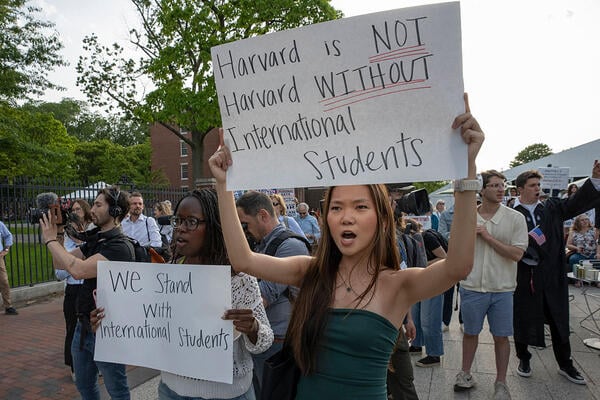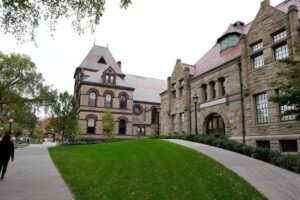
DHS Offers to “Simplify” Harvard Lawsuit
The Trump administration has extended an offer to Harvard University to “simplify” an ongoing legal battle by pulling back on threats made in a May 22 letter from U.S. Department of Homeland Security secretary Kristi Noem to revoke the institution’s ability to host international students.
At the time, Noem wrote in a letter to Harvard officials that DHS was stripping its Student Exchange and Visitor Program certification due to an alleged “failure to adhere to the law.” Harvard responded with a lawsuit, and a judge quickly granted a temporary restraining order to block the federal government from stripping Harvard’s SEVP certification, which would have likely resulted in a loss of international students and dealt the university a severe financial blow. (Harvard also sued the Trump administration over frozen federal research funding in April.)
Harvard argued in its May lawsuit that the revocation was “a blatant violation of the First Amendment” and due process and a retaliatory move by the federal government after the university rejected demands to control its governance, curriculum and the “ideology” of faculty and students. The move, according to the lawsuit, could potentially “erase a quarter of Harvard’s student body” and would harm students who had already been admitted to the university.
Now, in a Wednesday court filing, government attorneys have agreed “that the May 22 letter will not be used to revoke Harvard’s SEVP certification or Exchange Visitor Program designation.” They called the proposal “an attempt to jointly simplify the case.”
DHS officials wrote in the filing that they are “open to counterproposals and a meet and confer.” However, they wrote that Harvard “did not accept.”
Harvard declined to comment and DHS did not respond to an inquiry from Inside Higher Ed.
As Harvard and the federal government battle over international students in court, the Trump administration has found other ways to ratchet up pressure on the nation’s wealthiest university. Last month the U.S. Department of State announced it was opening an investigation into Harvard’s eligibility to participate in the Exchange Visitor program, which is overseen by the State Department and grants J-1 visas for visiting scholars, researchers and postdocs. Secretary of State Marco Rubio wrote that the probe will ensure programs don’t “run contrary to our nation’s interests.”
There have been recent reports—and denials—that Harvard is nearing a settlement with the Trump administration, which, in addition to attempting to cut off its flow of international students, has leveled a litany of claims against the university, including vague allegations of unlawful action and accusations of antisemitism. The Trump administration has demanded sweeping changes at Harvard, which the university has largely rebuffed thus far.
Congressional Democrats have threatened to investigate if Harvard agrees to a settlement.
If Harvard settles, it would be the third Ivy League university to strike a deal with the federal government since mid-July. Columbia University was the first, agreeing to a seemingly unprecedented settlement, which closed investigations into allegations of antisemitism and restored some frozen research funding in exchange for changes to admissions, academic programs and other concessions that will be overseen by a third-party resolution monitor. Columbia agreed to pay $221 million as part of the settlement.
Brown University also reached an agreement in late July to settle investigations into alleged antisemitism and restore about $510 million in frozen federal research funds. Brown agreed to spend $50 million on state workforce development efforts, provide admissions data to the federal government and bar transgender athletes from competing, among other stipulations.
Outside the Ivy League, the University of California system announced earlier this week that it intends to negotiate with the federal government over $584 million in suspended federal funding amid Department of Justice investigations into alleged antisemitism. UC officials said the system is seeking a “voluntary resolution agreement” with the Trump administration to restore funding.

Source link


